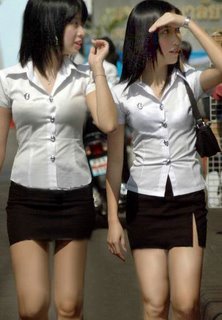Student Uniforms
 The student uniform, once again, has become the center of attention when the Japanese media announced that Thai university uniforms, with its short-sleeve white blouse and short black skirt, as the world’s sexiest student uniform, based on an online survey. The news has caused people in the educational sphere to strike a note of disapproval one after another.
The student uniform, once again, has become the center of attention when the Japanese media announced that Thai university uniforms, with its short-sleeve white blouse and short black skirt, as the world’s sexiest student uniform, based on an online survey. The news has caused people in the educational sphere to strike a note of disapproval one after another.
Deputy Education Minister Chaiyos Jiramethakorn said universities and business colleges should come down hard on revealing outfits. He said the ministry is set to call in university administrators to discuss the problem and work out policies to deal with it.
Quite a few people suggest that student uniforms be discontinued in order to end the fuss.
Regardless, it must be admitted that university students these days wear uniforms that grown-ups regard as improper.
They dress in a very short skirt and a slim-fit blouse that allow parts of their body to be easily seen.
One main reason is that they want to adapt their uniform to the current popular fashion trend in order attract eyeballs. Such is a common habit among those going into adulthood.
Educational institutes, themselves, are partly to blame, many have made their student uniforms more flashy in hopes of attracting more students to enroll. The practice is prevalent among business and vocational schools. Sadly, for some schools, academic excellence or the quality of teaching does not seem to be their focus anymore.
The most popular type of student uniforms are the one likened to a Japanese uniform, which consists of a high-waisted top, a plaid skirt and long crew socks.
In universities, although there are rules governing student uniforms, students usually modify their outfits to make them more attractive, like making the skirt shorter or the shirt tighter than is permitted.
Some may say imposing a dress code on students does not solve the problem of sexy and improper outfits because they will eventually find their own way to restyle the uniforms.
Still, scrapping the student uniform would not put an end to this problem either, since some students certainly will wear more revealing clothes.
While those who never step out of the line will continue to wear plain outfits.
Therefore, having uniforms should be better than not having ones at all.
At least, the existence of uniforms will help teach our children about discipline and courtesy. Uniforms will remind them of their status as students whose role is to study and seek knowledge. Students in uniforms should be mindful in whatever they do or don’t do.
Just like Buddhist monks, whose orange gown will warn them against any wrongdoing. (though, some may apparently choose to do it, dressed as commoners.)
 The most practical solution could be to educate and make students appreciate the value of wisdom and good deeds, instead of external beauty, stardom and fame.
The most practical solution could be to educate and make students appreciate the value of wisdom and good deeds, instead of external beauty, stardom and fame.
The cannot be achieved simply by setting rules or organizing a few hours of training programs.
But good conscience should be gradually instilled in students through constructive and self-improvement activities that give the young guns space to exercise and exhibit their skills and abilities. And they should be entitled to rewards, praise and respect.
Of course, this is not a cure-all medicine, but at least, the method has its own benefits and has no negative side effects.
Taken from “Kuan Nam Hai Sai” column, Naew Na newspaper, Page 5, January 28, 2011
Translated and rewritten by Wacharapol Isaranont
Please note that the views expressed in our “Analysis” segment are translated from local newspaper articles and do not reflect the views of the Thai-ASEAN News Network



This is my first time visit at here and i am actually pleassant to
read everthing at single place.